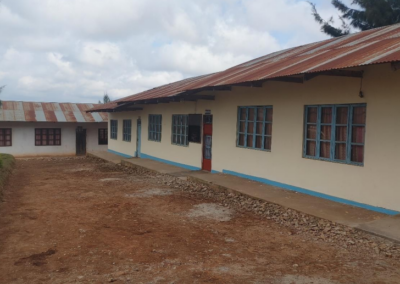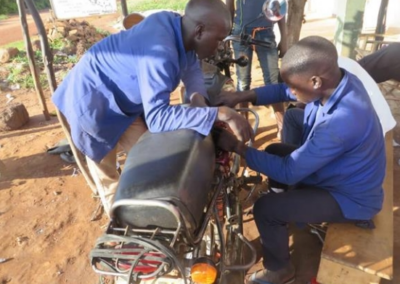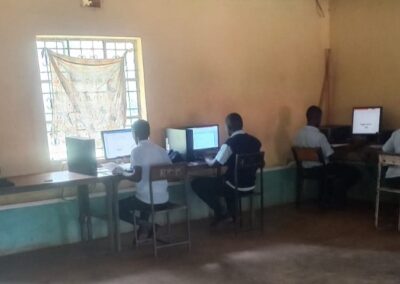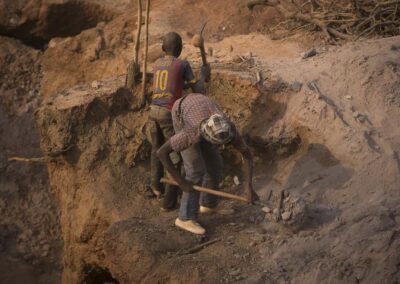The Van Doorn Foundation helps the Community Initiative for Development Communication (CODEC) in Cameroon to establish a vocational training centre for teenage mothers in Menji, Cameroon. CODEC already successfully set up such a centre in Limbe in 2015 and now wants to set up a second centre in Menji.
Gered Gereedschap makes the necessary equipment (sewing machines) available and the Van Doorn Foundation funds for the purchase of training material and the salary of 2 trainers for the first year.
Project is proceeding very well!
Amount collected: € 3,300.-
Project information
The situation
The Aminkeng Centre for Empowerment of Young Women is located in Limbe, in South-West Region of Cameroon. A branch of the Aminkeng Centre is planned in Menji, in the same region. Menji is situated in the Lebialem Highlands, in Southwestern part of Cameroon. It’s an agricultural community that depends on subsistence agriculture to survive. The main crops grown include cassava, colocasia, plantain, bushmeat hunting for protein requirements and a very low production of cash crops such as cocoa and coffee. Non-sustainable agricultural practices are carried out in an environment that is a global hotspot for biodiversity.
Limbe is situated at the foot of Mount Cameroon and is one of the few towns found on the coast of Cameroon. Economically, Limbe is the centre of the country’s only oil refinery, SONARA and the seat of the largest agricultural company, CDC. The region has recently become a destination for displaced persons fleeing conflict. Without life skills, crime is the only alternative.
The importance of the project
Since October 2016 there has been social unrest in this region, due to marginalization of the Anglophone minority (20%) in this region by the Francophone majority (80%). Without life skills young women are forced into prostitution and child marriages for survival. There are early pregnancies and births, consumption of drugs, spread of diseases, robbery and low schooling.
Single mothers in Cameroon experience the burden of poverty, gender discrimination, unemployment, stigmatization and poor living conditions. Resulting negative outcomes for their children such as increased mortality, poor educational attainment, poor health, and delinquent behaviours.
While Limbe has many primary and secondary schools and a few vocational centres, Menji has only one secondary school, two primary schools and no vocational training centre. A survey conducted by CODEC also showed that the majority of professional centres in Limbe (13 in total) are actually small individual workshops that train between 2 and 6 students without a formal curriculum. This actually concerns more child labour and exploitation than training as the “apprentices” as they are called, are more inclined to working for their masters than training.
The implementing organisation
This project is implemented by CODEC (Community Initiative for Development Communication). CODEC was founded in 2012 by benevolent community volunteers, who themselves were victims of the scourges of poverty, poor health, illiteracy, exclusion of community development and decision-making processes.
It established in 2015 the AMINKENG centre in Limbe, where with subsidies from local authorities, it conducts training and generates revenues from products made by the women in a front-shops at the centre. The centre in Limbe was equipped with sewing machines from with community contributions (CODEC members).
The envisaged project results
Because of the alarming situation in Menji, CODEC wants to establish a second training centre there in 2019. Just like in Limbe, CODEC wants to teach young women the knowledge and skills that enable them to improve livelihood. The centre aims to develop single teenage mothers’ skills in tailoring and making interior and exterior decorations. The centre envisages to train at least 150 young women a year and provide them with technical support and micro credits allowing them to start small businesses and create a marketing chain for their products.
The chance of sustainability
With the support of the Van Doorn Foundation, CODEC has developed a business plan for the Aminkeng training centre that which helps it to achieve the centre’s objectives, allows it to run the centre efficiently and increases the sustainability of the centre. The annual costs are estimated at € 19,000 (training centre, teachers, learning materials, etc.) and the annual income at € 20,000 (course fees and sales of items made by students).
The progress of the project
The first year of operation the new centre requires an estimated € 26,300. CODEC can contribute the operational cost of € 13,200 from the revenues of training fees and the sales of products made by the students. CODEC is also expecting a subsidy from the national employment fund of € 2,000 for the microcredits or grants to trainees. The community makes the training venue available, valued at € 3,000.
The Foundation Gered Gereedschap from The Netherlands made available the necessary training equipment, valued at € 4.800, consisting of sewing machines that were delivered in July 2019.
The Van Doorn Foundation will contribute € 3,300 for the procurement of training material and paying the salaries during the start-up period for the two trainers of the new training centre.
The result
Before the arrival of the sewing machines supplied by Gered Gereedschap, CODEC had already furnished the Aminkeng training center in Menji with school furniture, connected it to the electricity grid, and recruited the instructors.
Simultaneously with the arrival of the sewing machines, the Van Doorn Foundation provided the funds for the purchase of training material and for the salaries of the instructors.
The first group of teenage mothers have now started their training and have learned the basic knowledge of tailoring so that they can now put it into practice and can make the first (salable) garments.
For these projects your support is necessary!

Bedankt!
Bedankt dat je wilt bijdragen aan dit project! Vul hieronder het formulier in en je wordt naar een iDeal pagina gebracht om de betaling te kunnen doen.




